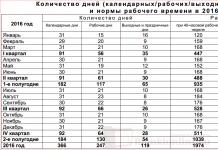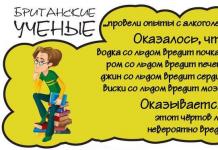Let us turn again to the inexhaustible English language for translations. This time we invite you to talk about prepositions of place and time, which in Russian are expressed by one multifaceted and capacious “do”.
In our publications, we have already raised the topic of the fact that when translating Russian sentences into English, many are faced with the problem of choice. This can be demonstrated in a few sentences. In each of them, the preposition “before” is deliberately used:
How can I get to Trafalgar Square?
The biblical flood occurred before the birth of Christ.
The hill is so high. How did you manage to get here so quickly?
If you live to be my age, we'll see.
The list can be continued for a very long time. And in each new sentence there will be a new translation of the preposition “before”.
The main representatives of the preposition “before” in the category “time” are the above-mentioned till/ until, before, up to.
English prepositions till/ until
The prepositions till/ until can be translated from English as “until”, “until”. These prepositions are used interchangeably in English, with 'until' being more formal.
Their meaning indicates the moment up to which the action is performed:
I will love you until the end of time. - I will love you until the end of my years.
Mother will stay at our place until June. - Mom will stay with us until June.
Also, the English prepositions till/ until indicate the moment before which the action was NOT performed and will not be performed:
The train tickets are not available until next Saturday. - Train tickets will go on sale only next Saturday.

English preposition before
This preposition is universal in relation to time and space. However, it is not a synonym for till/ untill. The meaning of the preposition before contains the following idea - in its temporal meaning it indicates the precedence of any event, before any event:
Before breakfast I always go for a jog. - I always go for a run before breakfast.
In the English language there is a stable temporary concept “BC” or in other words “before the birth of Christ”. It can be used alone or in combination with the designation of the year:
Romans invaded British Isles 445 BC. - The Romans invaded the British Isles in 445 BC.
BC stands for ‘ before Christ’.
English preposition ere
Another temporary preposition meaning “before”, “before” is ere. This word is more often used in poetic literary language and completely replaces the preposition before:
I would die here I betray you. - I would rather die, but I will not betray you.
All vespertine creatures dream here night. - All creatures that cherish the night sleep until the day passes.
As for prepositions of direction, it is much easier with them, because most of them are interchangeable. Since the Russian “to” implies movement from point A to point B, the preposition becomes the leader in our selection to and various combinations with it:

The last combination in this list can be used in a temporary meaning if used without the element ‘ here', which alludes to the place:
I’ll have to study this subject up to June. - I will have to study this subject until June.
In this meaning the English preposition up to indicates the time limit until which an action will take place.
We have already talked about prepositions of direction in English in more detail. You can familiarize yourself with the features of their use in the article.
In conclusion, we would like to return to the translation of the sentences with which our story began. So, having all the necessary information and translation options for the Russian preposition “before” at hand, we can offer the following solution:
How can I get to Trafalgar Square? - place
Genesis flood took place BC. - time
The hill is so high. How could you manage to get up to here so fast? - place
Live to my great age and we’ll see. - time
We wish you interesting language practice and see you soon!
Victoria Tetkina
Although, for now we will formally assume that the tense of the verb, which is called Future Simple Tense is the basic tense for expressing the future tense in English. By the way, in complex sentences of time and condition in English, which will be discussed in this lesson, it is the Future Simple Tense that is used.
What are subordinate clauses of time and conditions?
Can refer to the present and future tense (real conditions), as well as unreal. In this lesson we will talk about complex sentences that refer to the future tense, type
If the weather is good, I will go for a walk.
Such sentences in English are called conditional sentences of the FIRST TYPE (First Conditionals). Another name is When and If Sentences / First Conditional and Time Clauses.
Please note that in the example in Russian in both parts: in the first part (subordinate clause) and in the second part (main clause), the future tense is used.
However, in English there is a RULE: after IF/WHEN there is no future.
It means that in the subordinate clause Instead of Future Simple, you need to use Present Simple.
NOTE. The conjunction IF can be replaced by any other conjunction of time or condition.
Now it's time to get acquainted with the unions of time and condition.
2. Conjunctions of time and conditions in English
If you are a beginner, then remember two main conjunctions if (if) And when (when).
- I will stay if she comes. - I'll stay If she will come.
- I will leave when he comes. - I'll leave, When he will come.
A. Conditional conjunctions in English:
- if - if
- unless - if not
- on condition that - provided that
- I will stay if she comes. - I'll stay If she will come.
- I will stay providing she comes. - I'll stay provided that only she will come.
- I won't stay unless she comes. - I won't stay If she Not will come.
Please note that in English conditional sentences there is no comma.
B. Time conjunctions in English
- when - when
- as soon as - as soon as
- till (until) - until (not)
- before - earlier, before
- after - after
- I will leave when he comes. - I'll leave, When he will come.
- I will leave as soon as he comes. - I'll leave, as soon as he will come.
- I won't leave till he comes. - I will not leave, Bye He Not will come.
- I had left before he came. - I left before he came.
- I left after he had come. - I left after he came.
So, let's summarize this topic and formulate the main RULE once again.
In subordinate clauses relating to the future, after conjunctions when And if and others, instead of the future tense (Future Simple), you must use the present (Present Simple). Such sentences in English are called First Conditional and Time Clauses.
To self-test, select the correct option.
I hope you have read the rule, examples and translation carefully. If your opinion differs from the opinion of the MAJORITY, then return to the beginning of the lesson. And we move on to the exercises.
3. Subordinate clauses of time and conditions in English. Exercises on First Conditionals
ATTENTION! These offers are not conditional. The rule doesn't work there!
I'd like to know when Dan will be back. “I would like to know when Dan will be back.”
I don't know if she will come home.“I don’t know if she will come home.”
Exercise (introductory).
1. I wonder if he (laugh) all day.
2. She will buy a new bag when she (arrive) to London.
3. I will stay here till he (come).
4. Tell him about it if he (want).
5. I wonder when someone (come and tell) her what to do.
6. Do you know if your uncle (come back) from his trip tomorrow?
7. Don’t tell her about it before she (ask).
8. I will know all about it when I (get) a letter from her.
9. She will catch bad cold unless she (go and change) her wet shoes.
10. I wonder when you (be ready) and if you (be on time).
11. I am not sure when she (return).
12. Will you wait until he (come)?
13. Please, book a return ticket if you (get) to New York.
14. I shall cut some sandwiches in case they (be) hungry.
Exercise 1. Fill in the blanks with when or if.
Do the exercise if you confuse the conjunctions when and if.
1. … I go home tonight, I’ll have a bath.
2. … there is a good program on TV, I’ll watch it.
3. … there’s nothing in the refrigerator, we’ll eat out.
4. We’ll go skiing next winter… we have enough money.
5. … it’s a nice day tomorrow, we’ll go swimming.
6. I’m coming to London tomorrow. I'll phone you...I arrive.
7. We’re thinking of going to Spain for our holidays. …we decide to go, I’ll let you know.
Exercise 2 . Insert when or if periods instead.
A similar exercise, but in the second part the imperative mood is sometimes found.
1. … you can’t do your homework, ask for help.
2. I’ll give the money back to you, ... I see you next time.
3. I’ll come to bed … this program ends.
4. … anyone phones me, tell them I’m out.
5. Come on! … we hurry, we’ll catch the bus!
6. … I play tennis with Justin, he always wins.
7. The shops are full of things to buy … Christmas comes.
8. “I’ve lost my bag.” - “...I find it, I’ll let you know.”
Exercise 3. Compose a complex sentence from two simple ones using the conjunctions given in brackets. Apply rule 1.
SAMPLE: I’ll wait here. You'll get back. ( until) - I'll wait here until you get back.
1. Give me a ring. You'll hear some news. (when)
2. The TV program will end. I'll do my homework. (after)
3. I'll go to work. I'll have a bath. (before)
4. She'll be in Paris. She'll visit friends. (when)
5. The lesson will end. I'll go home. (as soon as)
6. I won't leave the house. The postman will call. (until)
7. Can you feed the cats? I'll be away, (when)
8. I’ll tell you about the holiday. I'll get back. (when)
9. I’ll study English. I'll speak it perfectly. (until)
Exercise 4. Your friend is going on vacation. Ask him questions about his trip.
SAMPLE: What/do/miss/plane? — What will you do if are you missing the plane?
1. What/do/plane/be delayed?
2. Where/stay/hotels/be full?
3. Who/talk to/not make any friends?
4. What/do/not like the food?
5. Where/go/beaches/be crowded?
6. What/do/get sunburnt?
Exercise 5. Open the brackets using the tenses correctly Future Simple And Present Simple.
SAMPLE. When I (see) Tom tomorrow, I (invite) him to our party. — When I see Tom tomorrow, I will invite him to our party.
1. Before you (leave), don’t forget to shut the windows. 2. I (phone) you as soon as I (arrive) in London. 3. Please don’t touch anything before the police (come). 4. Everyone (be) very surprised if he (pass) the exams. 5. When you (see) Brian again, you (not/ recognize) him. 6. We (not/start) dinner until Jack (arrive). 7. (you/ feel) lonely without me while I (be) away? 8. If I (need) any help, I (ask) you. 9. Come on! Hurry up! Ann (be) annoyed if we (be) late.
Exercise 6. Combine two sentences into one using the example. Use time conjunctions or conditions to make sense.
SAMPLE. You are going to leave soon. You must visit the doctor before that. — You must visit the doctor before you leave.
1. I’ll find somewhere to live. Then I'll give you my address.
2. It’s going to start raining. Let's go out before that.
3. I’m going to do the shopping. Then I'll come home straight.
4. You’ll be in London next month. You must come and see me then.
5. I’m going to finish reading this book. Then I'll get the dinner ready. (when)
6. We’ll make our decision. Then we'll let you know. (as soon as)
Exercise 7. Insert if or when periods instead.
1. … I see Tom tomorrow, I’ll invite him to our party.
2. … it rains this evening, I won’t go out.
3. I’ll phone you… I get back.
4. I’m feeling very tired. I think I’ll go straight to bed… I get home.
5. I’ll be very surprised...he doesn’t get the job.
Exercise 8. Make semantic chains of sentences using the example using if and will.
SAMPLE. If the earth gets warmer, the sea will get warmer. — If the sea gets warmer, the ice at the North and South Poles will melt. — If the ice..., etc.
1. the earth gets warmer
2. the sea gets warmer
3. the ice at the North and South Poles melts
4. the sea level rises
5. there are floods in many parts of the world
Exercise 9. Your friend is going abroad. Ask him questions.
SAMPLE: What/do/fall ill? - What will you do if did you fall ill?
1. What/do/lose your passport?
2. What/do/not like/the food?
3. Where/go/need to phone your parents?
4. What/do/want/to make friends?
5. What/do/decide to improve your pronunciation?
Exercise 10. Put the verbs given in brackets into the correct form. The proposals are for the future.
1. If you (eat) another cake, you (be) sick. 2. You (fail) your exam if you (not/study) hard. 3. What do you (do) if you (fail)? 4. Our children and grandchildren (suffer) if we (not/look after) our planet. 5. If you (be) late, I (go) without you. 6. If she (pass) her driving test, she (buy) a car. 7. If my neighbors (not/stop) making a noise, I (complain).
Before we talk specifically about if/when clauses, let's look at what a subordinate clause is.
Complex sentences consist of:
1. Main sentence
2. Subordinate clause (there may be more than one)
Subordinate clause is a dependent part that cannot exist separately from the main sentence and is joined to it using a conjunction.
For example (subordinate clauses are highlighted in orange):
After if and when, is it present or future tense?
The rule in English is:
In subordinate clauses of time and condition, the future tense is not used.
In Russian, the future tense is used in both parts of complex sentences:
We will return home if it rains. (Condition)
We will return home when it rains. (Time)
In English in subordinate clauses and conditions the present is used:
We will come back home if it rains. (Condition)
We will come back home when it rains.
(Time)
Subordinate clauses are opened by conjunctions: till, until, as soon as, as long as, before, after, etc.
Subordinate conditions are opened by conjunctions: unless, on condition that, provided, in case, etc. After the conjunctions when and if, the present and future can be used.

It all depends on whether they open clauses/times or clauses-objects: To check whether a clause with when subordinate tense , ask him a question. The clause of time answers the question "when?" You can also try replacing it with “tomorrow” or any other time circumstance (next month, next year, etc.). If it retains meaning, then.
it does not use future tense If the when clause answers the question "what?" and it can be replaced with something or some information, then future tense can be used , since this.
subordinate clause
 IF: If It's easier with If. If if is translated as , then this is a subordinate clause. Means,.
IF: If It's easier with If. If if is translated as , then this is a subordinate clause. Means,.
future tense cannot be used If if is translated as whether , then this is a subordinate clause..
The future tense can be used– past perfect tense. Its peculiarity is that it is not used independently in speech and is necessarily tied to another action. Why do the British need this? The reason lies in their love of order and organization. In Russian, we use one tense to express all past actions. We list a few events, then go back to another event that happened before all the others. An Englishman will never allow such “chaos” in his speech. If he forgot about an important event that happened before everyone else, he will report it at a time specially designated for this - The future tense can be used.
How is the past perfect formed?
Statement
Predicate in The future tense can be used consists of two parts: an auxiliary verb had and the third form of the main verb (we add the ending to the regular verb - ed, and take the irregular form from the third column).
Negation
In a negative sentence between an auxiliary verb had and the particle appears as the main verb not.
As in many other times, in The future tense can be used There are shortened forms that are used in colloquial speech. In an affirmative sentence had combined with a pronoun, in the negative – with a particle not. For example:
- I'd done.
- You'd decided.
- I hadn't done.
- You hadn't decided.
Question
An interrogative sentence begins with an auxiliary verb had followed by a subject and a main verb.
In order to consistently study The future tense can be used, we have divided all its functions into three levels. In the green block you will find what you need to know at a basic level, in the yellow block - at an intermediate level, in the red block - at a high level.
Using the Past Perfect
First level
The future tense can be used always goes hand in hand with another action in the past. The future tense can be used shows an action that occurred before another action or a specific point in the past. Another action in the past is most often indicated Past Simple, and special words may be used: by... (at some time/moment), after(after), before(before, before) when(When), earlier(earlier), first(first, first).
We arrived at the station at 7.30, but the train had left. – We arrived at the station at 7:30, but the train was already gone. (first the train left, then we arrived at the station)
He had been a usual clerk before he became a successful businessman. - He was an ordinary clerk before that, How became a successful businessman.
Often The future tense can be used explains the reason: we want to show that the action expressed The future tense can be used, caused another action to occur.
He was hungry. He hadn't eaten for eight hours. - He was hungry. He did not eat eight hours.
She couldn’t buy a new pair of shoes as she had lost her credit card – She couldn’t buy a new pair of shoes because lost credit card.
Time The future tense can be used similar in meaning to Present Perfect with the difference that the time of action does not take place in the present (now), but in the past (then).
They are not at home. They have gone shopping. → They were not at home. They had gone shopping.
Their No Houses. They gone go shopping. → Their did not have Houses. They gone go shopping.
Another common feature Present Perfect And The future tense can be used– adverbs just(just now), already(already), yet(already, yet).
They were moving to another country, but they hadn't told their parents yet. – They moved to another country, but haven't said yet about this to your parents.
The most common mistake made with The future tense can be used– use this tense where it is not necessary, most often instead Past Simple. For example, when we talk about a simple action that happened a long time ago. remember, that The future tense can be used only works when there are two actions.
I learned English at school. - I learned English at school.
I had learned English before I entered the university. - I learned English before that, How entered the University.
Where else is the past perfect found?
Average level
- The future tense can be used shows that an action began in the past and continued until a certain point in the past. Prepositions already familiar to us are often used here. for(during) and since(since).
He didn't want to drive that car anymore. He had driven it for 30 years. “He didn’t want to drive that car anymore.” He drove her 30 years old.
Her speech was impressive. She had worked on it since Monday. “Her speech was impressive. She worked over it since Monday.
This feature is not fully applicable to The future tense can be used, she belongs by right Past Perfect Continuous. The future tense can be used in this sense it is used with stative verbs (), that is, verbs that cannot "last".
Before we talked, Mary had been upset for three days. She had been crying all this time. – Before we talked, Mary was upset for three days. She cried all this time.
- IN The future tense can be used, As in Present Perfect, there is a function with which we talk about personal experiences. The difference is that The future tense can be used we use when talking about our experiences in the past.
The last week of my holidays was the worst week I had ever had. – The last week of my vacation was the worst week I have ever had. was.
By the time I moved to Dublin I had written seven books and I was working hard on the eighth. – By the time I moved to Dublin, I wrote seven books and actively working on the eighth.
Complex cases of using Past Perfect
High level
- The future tense can be used used after if in conditional sentences of the third type (). This type of conditional shows regret about the past. We could have done something in the past if we had fulfilled the condition, but in the present we can no longer change the situation.
If I had known about your problem, I would have helped you. – If I knew about your problem, I would help you.
If you had read the morning newspaper, you would have agreed with me. – If You read morning newspaper, you would agree with me.
- The future tense can be used used in structures hardly ... when And no sooner ... than. These constructions show that one action happened immediately after another. The peculiarity is that they use reverse word order, as in a question. Such sentences are translated into Russian using the words “as soon as”, “I didn’t have time”, “as soon as I did”.
Hardly had the plane landed at the Miami airport, when it started to rain. – Barely airplane landed at Miami airport, How it started to rain.
No sooner had I chewed my sandwich than somebody knocked at the door. – Did not have time I chew your sandwich How someone knocked the door.
- In modern English The future tense can be used are increasingly being replaced by Past Simple, this is especially true for American English. We can use Past Simple instead of The future tense can be used, if the sequence of events is clear from the context. In such sentences there are words after(after), before(before), earlier(earlier), first(first, first), etc.
After he had finished repairing his car, he took a shower. = After he finished repairing his car, he took a shower. – After He finished repairing the car, he took a shower.
I agreed to meet her though I was angry with her as we had quarreled earlier. = I agreed to meet her though I was angry with her as we quarreled earlier. “I agreed to meet her, although I was angry with her, because we had a fight.
This rule does not work with the conjunction when(when): changing tense may change the meaning of the entire sentence.
When we came home, she had cooked already prepared dinner. (Past Perfect means dinner was done before we got home)
When we came home, she cooked dinner. - When we came home, she prepared dinner. (Past Simple shows that first we came home and then she cooked dinner)
The more complex time seems, the less meaning it has. This rule also applies to The future tense can be used. The main thing to remember is that next to The future tense can be used there must be another action in the past. To better remember this time, take the test and download the table, which you can always look at and refresh your knowledge.
(*.pdf, 183 Kb)
Test
Past Perfect – past perfect tense in English
We continue the theme of Future Simple.
Today we’ll talk about the most common question: is it necessary to put Will after words such as: When, As soon as, If, After, Before? If necessary, then in what cases. And when in English is Will placed after If and When?
REMEMBER: DO NOT put Will in front of the following words:
When - when,
If - if,
After - after,
Before - before,
As soon as - as soon as,
As long as - as long as
While - bye,
Until / unless - not earlier, except
In case - in case.
Examples - when Will is not used after When, If, As soon as, Before, After
When I leave work I'll text you.
I'll text you when I get off work.
After I get home he will email you.
He will write /email/ to you when he gets home from work.
Before I leave home she will call you.
She will call you before leaving the house.
I’ll do it as soon as I get home.
I'll do it as soon as I get home.
Examples in which cases Will is used after If and When
1. When there is a certain condition of the promise:
I will be very happy if you will come to my party.
I will be happy if you come to my party.
We should finish the job early if Ted will help us.
If Tad helps us, we should finish the job early.
If you will be nice we will go to the park.
If you behave, we'll go to the park.
2. When If has the meaning: - LI -.
Do you know if Anna will go with us?
Do you know if Anna will come with us?
3. When a sentence implies an answer to the question “what?”
I’ll tell you when Mark will fly to Moscow.
I'll tell you when Mark arrives.
I'll say what? fact - when Mark arrives.
4. When time is implied:
Could you tell me when you will know the results?
Could you tell me when / what time / you will get the results?
Compare, the same sentence without will has a different meaning:
Could you tell me when you know the results?
Let me know when you get the results.
Another example, very ours, Russian.
Usually we say:
“Text me when you get home.”
Those. When you arrive, write to me that you have arrived.
In English it will sound like this: Write me when you get home.
But if you write this sentence to a foreigner with will: Write me when you will get home- “Write to me when you arrive,” he will answer you like this:
I'll get home in two hours. I'll be home in two hours.
He will not understand that you asked him to write to you that he arrived. He will understand that you are asking him: “How long will it take you to arrive home, please write.”
Now, let's consolidate the material.
Exercise 1
Put the verbs in the correct form.
Say these sentences in Russian.
1. I (go) to the dentist as soon as I (have) a toothache.
2. I (come) home when I (finish) work.
3. Your sister (be) angry when she (come) back.
4. I (stay) at home until you (call) me.
5. As soon as Tom (lose) his job, he (find) another one.
Correct answers to exercise #1
1. I’ll go to the dentist as soon as I have a toothache.
2. I’ll come home when I finish work.
3. Your sister will be angry when she somes back.
4. I’ll stay at home until you call me.
5. As soon as Tom lost his job, he found another one.
1. When my tooth hurts, then I’ll go to the doctor.
2. I will go home when I finish work.
3. When your sister returns, she will be angry.
4. I will be at home until you call me.
5. When Tom lost his job, he immediately found another one.
Exercise 2
Choose the correct completion of the sentence.
1. I’ll do it as soon as ….
I will finish cleaning.
I finish cleaning.
2. I have to tidy the room before….
My mum will come.
My mum comes.
3. I… to him about it when we meet.
I will talk.
I talk.
4. I refuse to go there unless you … with me.
You will come.
You come.
5. He is going to stay in our flat while ...
We are in Moscow.
We will be in Moscow.
6. I'll call you up after...
they repaired my telephone.
they have repaired my telephone.
7. If I ... my house, I will take a long holiday.
If I will sell.
If I sell.
8. You should read the contract carefully before you...
Will sign it.
Sign it.
9. I’ll speak to him about it when I… him.
I will see.
I see..
10. If I lose my job, I looking another one.
I will start.
I start.
Correct answers to exercise #2
1. I’ll do it as soon as I finish cleaning.
2. I have to tidy the room before my mum comes.
3. I will talk to him about it when we meet.
4. I refuse to go there unless you come with me.
5. He is going to stay in our flat while we are in Moscow.
6. I’ll call you up after they repaired my telephone.
7. If I sell my house, I will take a long holiday.
8. You should read the contract carefully before you sign it.
9. I’ll speak to him about it when I see him.
10. If I lose my job, I will start looking another one.
Exercise #3
Make up the correct sentences.
1. We'll get there. We'll send a message. (soon after)
2. I would like to finish it. It will get dark. (before)
3. We are going to have the rest. We'll be on holiday. (while)
4. He will not regret it. She'll move away. (until)
5. Can you water the flowers? We'll leave the house. (when)
6. Get in touch with him. I'm going to write to him. (as soon as)
7. Come to see me. You'll feel alone. (whenever)
8. I will find the opener. I will open the bottle. (the moment)
9. We will go to the shop. We will be walking the dog. (while)
10.I’ll have finished my lesson by noon. I'll come round. (after)
Correct answers to exercise #3
1. Soon after we get there, we will send a message.
2. I would like to finish it before it gets dark.
3. We are going to have a rest while we are on holiday.
4. He will not regret it until she moves away.
5. Can you water the flowers when we leave the house.
6. Get in touch with him as soon as I write to him.
7. Come to see me whenever you feel alone.
8. The moment I find the opener, I will open the bottle.
9. We will go to the shop while we are walking the dog.
10. After I have finished my lesson by noon, I will come round.
2. We’ll stay here till she returns.
3. Please call us when you arrive.
4. I don’t know when the party will start.
5. He'll drive you there whenever you need.
6. He will wait for you until you are back.
7. Don't worry! I’ll watch you while you are swimming in the lake.
8. Will you recognize him the moment you see him?
9. Do you know when the shop will open?
10. I’ll be with you while you are waiting for the bus.
Exercise #4
Place will in front of verbs where required.
He rent this flat as long as he lives in Moscow.
As soon as you meet Janet, you love her.
Until you are eighteen, you do not drive a car.
If Barcelona win tomorrow they will be champions.
I come tomorrow unless I have to look after the children.
Correct answers to exercise #4
He’ll rent this flat as long as he lives in Moscow.
As soon as you meet Janet, you will love her.
Until you are eighteen, you will not drive a car.
You must wait here until your father comes.
They are coming after they have had dinner.
If Barcelona win tomorrow they will be champions.
I will come tomorrow unless I have to look after the children.


























